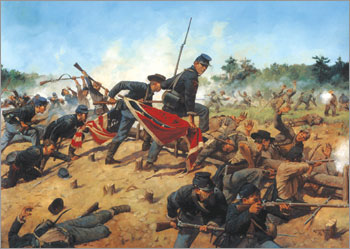
Here is a bio of Henry Hardenbergh by C.M. Stanley.
Little is known of the young man from what is now Tinley Park who was a
volunteer infantryman in the Civil War and earned his nation's highest award for
valor: the Medal of Honor. According to the state muster recorrds for the unit
he was in, Company G of the 39th Illinois Veteran Volunteer Infantry, Henry M.
Hardenbergh was born in Noble County, Indiana. When the Civil War started, he
was living in the tiny Cook County town of New Bremen which later became
Tinley Park. When he enlisted on August 15, 1861, he was single, 21 years old,
stood 5'9" and had light hair, blue eyes and a light complexion. His occupation
was listed as a carpenter.

To the right is an image of the painting by Keith Rocco of Henry
doing his Medal of Honor deed. The original is at the village hall in Tinley Park, Illinois.
The Preacher's Company: Company G was known as the "Preacher's Company"
because its organizer and first commanding officer, Captain William B. Slaughter,
was a Methodist circuit-rider minister who traveled between Blue Island and
Joliet. Many of the men in Company G came from Bremen, Orland, Palos and Worth
Townships in Cook County, and Homer and New Lenox Townships in Will County.
Others in the unit included Lieutenant Amos Savage, who had resigned as the
Homer Township Supervisor to enlist, and Orland Township Private Thomas Humphrey,
the older brother of John Humphrey, later a state Senator who's house is now
an Orland Park landmark.
Early Duty: After a brush with Confederate General "Stonewall" Jackson's
forces in the Shenandoah Valley and participating in the siege of Charleston, SC,
Hardenbergh was detailed to serve on a Requa batter. The Requa volley gun had
25 rifle barrels mounted parallel on a frame with wheels. It could fire 175
shots per minute. In January of 1864, many of the soldiers, including
Hardenbergh, re-enlisted. After a furlough at home, the 39th Illinois was sent to
Virginia.
Hardenbergh's Heroism: Starting on August 13, 1864, the regiment was involved
in strategic marches during a period of terribly hot weather. The regiment
started out with around 400 men but by the 16th, was down to just over 200 men.
The dwindling number was not caused by enemy action, but by sun stroke and
sickness. On August 16, the 39th Illinois took part in a 200 yard charge on enemy
entrenchments. Despite heavy fire, the rebel fortifications were reached and
overwhelmed. Hardenbergh, carrying his regiment's flag, was shot in his
shoulder. Another member of his regiment picked up the flag and carried it on, but
Hardenbergh kept going on to the enemy earthenworks. There Hardenbergh had a
hand-to-hand struggle with the color bearer of the 10th Alabama Infantry whom he
left mortally wounded and whose flag he took, according to a written account
by Captain Homer Plimpton of Company G. All this happened in the first minutes
of what would ultimately come to be known as the Second Battle of Deep
Bottom. The fight would last for three hours with the Confederates ultimately
beating back the Federals. According to the regimental history, 224 men were
involved in the battle, with 104 of them either killed or wounded.
Hardenbergh's Rewards: Flag captures were considered a special high honor
during the Civil War, Hardenbergh presented the rebel flag to his corps
commander, Major General David Birney. His heroism resulted in a recommendation for a
Medal of Honor. Hardenbergh's gallant conduct also earned him a recommendation
for an officer's commission in a U.S. Colored Regiment. Only whites served as
officers in black regiments. "He has been in my company over three years and I
have always found him to be a faithful and brave soldier and one who could be
trusted in any place and under all circumstances," wrote Lieutenant James M.
Harrington of Company G.
Hardenbergh's Death: But on August 28, before receiving his first
lieutenant's commission in the 36th U.S. Colored Troops, Hardenbergh was killed while on
picket duty. Hardenbergh's Medal of Honor also was awarded posthumously on
April 6, 1865. "He is silent in the grave, all unmindful of earthly rewards,"
Plimpton later wrote.
Henry M. Hardenbergh's Medal of Honor page.
C.M. Stanley says "I am always interested in hearing from people with an interest in
the 39th Illinois Infantry." Ballot at aol dot com.
From: Ballot <> Date: November 19, 2005 <> To: jch <> Subject: henry hardenbergh